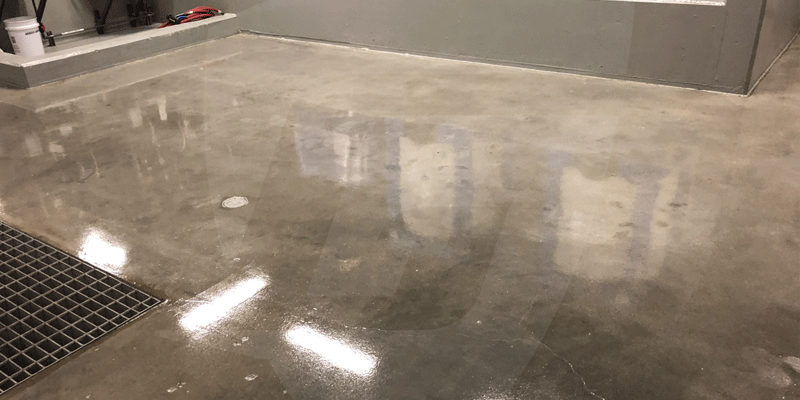While durable and aesthetically-pleasing, floor coating sealers are not right for every project or budget. In this article, we’ll explore the pros and cons of using a floor coating sealer so that you can make an informed decision about your next home improvement project.
Table of Contents
What is a Floor Coating Sealer?
Before discussing floor coating sealers, it’s important to understand what they are. A floor coating sealer is a clear or pigmented material that is applied to concrete, stone, terrazzo, or other porous surfaces to protect them from stains, moisture, and wear. Floor coating sealers can be either water-based or solvent-based and come in a variety of sheens ranging from high-gloss to matte.
There are two main types of floor coating sealers: penetrating and film-forming. Penetrating sealers soak into the pores of the surface to create an invisible barrier against moisture and stains. Film-forming sealers form a protective film on the surface that is impermeable to water and stains.
Why Use a Floor Coating Sealer?
There are several reasons why you might choose to use a floor coating sealer. First, floor coating sealers can improve the appearance of your floors by making them look brighter and more vibrant. Second, they can increase the durability of your floors by protecting them from stains, scratches, and wear. And third, they can make your floors easier to clean by repelling dirt and grime.
When Should You Use a Floor Coating Sealer?
Not all surfaces are suitable for a floor coating sealer. Porous surfaces such as unsealed concrete or stone are ideal candidates for a floor coating sealer because the sealer will be able to penetrate into the pores of the surface and create an invisible barrier. Nonporous surfaces such as vinyl or linoleum are not good candidates for a floor coating sealer because the sealer will not be able to penetrate into the surface and will instead sit on top of the surface, where it is susceptible to being scratched or scuffed.
How to Apply a Floor Coating Sealer
Applying a floor coating sealer is generally a simple process, but there are a few things you’ll need to keep in mind. First, make sure that you read the manufacturer’s instructions carefully before beginning. Second, if you’re using a water-based sealer, be sure to dilute it according to the manufacturer’s directions. And third, if you’re using a solvent-based sealer, be sure to ventilate the area well and wear a respirator to avoid inhaling fumes.
Once you’ve prepared the surface and gathered your materials, you’re ready to begin applying the floor coating sealer. For best results, start in a small area and work your way out. Apply the sealer with a brush, roller, or sprayer, being sure to follow the manufacturer’s directions. Once you’ve applied the sealer, allow it to dry completely before walking on it or putting furniture back in place.
Caring for Your Floors After Applying a Floor Coating Sealer
It’s important to take proper care of your floors after applying a floor coating sealer. For best results, follow the manufacturer’s instructions for cleaning and maintaining your floors. In general, you’ll want to avoid using harsh cleaners or scrubbing your floors too aggressively, as this can damage the protective seal.
Are There Any Disadvantages to Using a Floor Coating Sealer?
While floor coating sealers offer many benefits, there are a few potential disadvantages to using one. First, floor coating sealers can be expensive. Second, they can be difficult to remove if you decide you don’t like them. And third, they can change the appearance of your floors, making them look shiny or glossy.
Important Factors to Remember When Choosing a Floor Coating Sealer
When choosing a floor coating sealer, there are a few important factors to keep in mind. First, consider the type of surface you’ll be sealing. Porous surfaces such as concrete or stone will require a different kind of sealer than nonporous surfaces such as vinyl or linoleum.
Second, think about the level of protection you need. If you’re looking for a basic level of protection, a penetrating sealer might be all you need. But if you’re looking for maximum protection against stains and wear, a film-forming sealer might be a better option.
And finally, don’t forget to consider the cost of the sealer and the time and effort required to apply it.
Professional Floor Coating Installation vs. DIY Kits
If you’re considering having your floors professionally coated, you should know a few things. First, professional floor coating installation is usually much more expensive than DIY kits. Second, professional installers have access to high-quality products that might not be available to the general public. And third, professional installers are trained in the proper application of floor coatings, so you can be sure that your floors will be properly protected.
On the other hand, DIY kits have a few advantages over professional installation. First, they’re usually much less expensive. Second, they’re often easier to apply, so you won’t need to hire a professional installer. And finally, many DIY kits come with all the materials you’ll need for the job, so you won’t have to go out and purchase them separately.
Whether you’re looking to protect your floors from wear and tear or just want to give them a fresh, new look, a floor coating sealer may be the right solution for you. But be sure to do your research before making a decision, as there are both advantages and disadvantages to using one.

